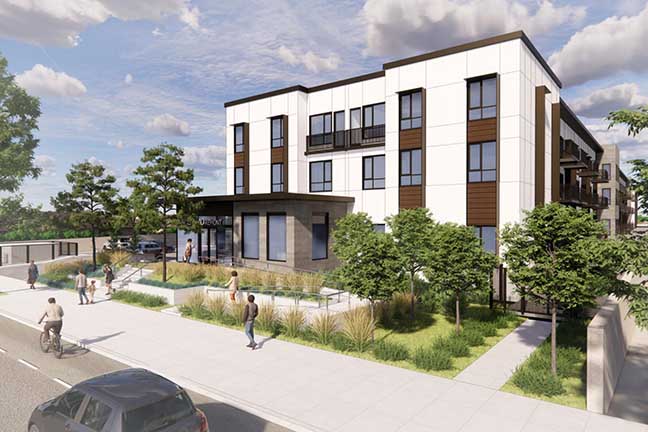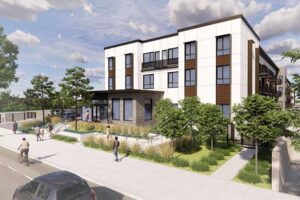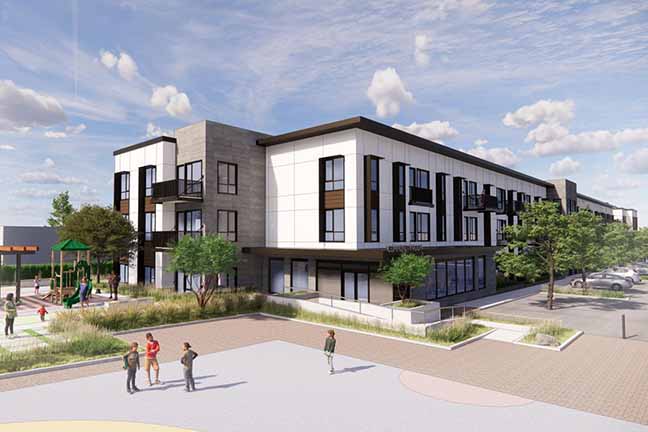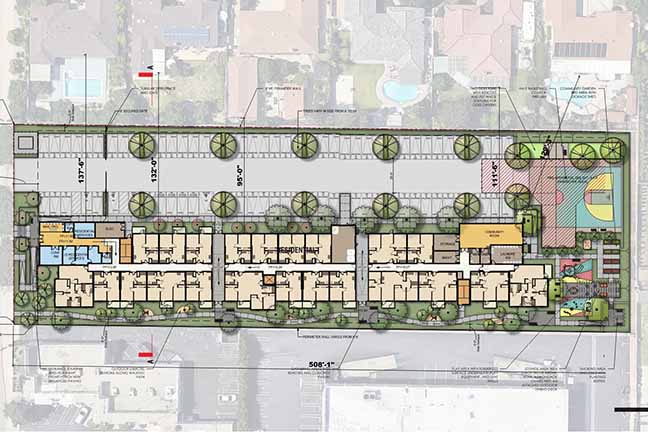Developer preparing to build affordable apartments for veterans

A street view rendering of Mercy Claremont, an affordable housing project for veterans proposed for a former church site in the 1300 block of Towne Avenue. Illustration/courtesy of Mercy Housing California
by Steven Felschundneff | steven@claremont-courier.com
The nation’s largest nonprofit developer of affordable housing has purchased a former church site in Claremont where it plans to build an apartment building for veterans, including some who are unhoused.
Mercy Housing California purchased the former Solid Rock Church, 1364 N. Towne Ave., last summer and plans to build a three-story building with 74 rental apartments on the 1.89-acre parcel. According to Zillow the property sold for $4.5 million on July 13.
The land was purchased using money from Mercy Housing’s $47 million California Land Acquisition Fund, which was launched in 2022 to make the company more nimble in California’s highly competitive real estate market. The fund is financed through partnerships with large organizations such as JPMorgan Chase, Wells Fargo Bank, and the California Endowment.
The former church site is a deep rectangular lot directly behind the commercial development on Foothill Boulevard where Stater Bros. market is located. To the north and east of the site are 11 single-family homes, most of which on Richmond Drive.

A street view rendering of Mercy Claremont, an affordable housing project for veterans proposed for a former church site in the 1300 block of Towne Avenue. Illustration/courtesy of Mercy Housing California
“Mercy Housing California is proposing to develop high-quality affordable apartment homes for veteran families and veterans who have experienced homelessness,” according to a news release from the company.
Representatives from the company, and the building’s designer, TCA Architects, held a community outreach meeting on Monday at the Hughes Center. It’s the third time Mercy has come to Claremont to discuss the project, but the first time it extended an invitation to all Claremont residents. The previous meetings were focused on gaining feedback from the residents of the 11 households whose properties directly border the site.
Amy Bayley, vice president of community planning at Mercy, gave a short introduction to her company and the project, then TCA Principal Armine Movsesyan discussed the building’s design and features.
The 74 apartments will include one-, two- and three-bedroom units, including one for the onsite manager. The structure will be on the south side of the property and will stretch nearly the entire depth of the parcel. The north side will include 78 parking spaces for a ratio of 1.1 spaces per residential unit. There will be separate age-appropriate playgrounds, an open space with a meandering path, and a dog run.
“Mercy Claremont is designed to be highly sensitive to the neighboring properties,” according to the company’s website. “The building massing is intentionally located approximately 100 feet away from neighbors’ homes along the south end of the site, adjacent to the commercial buildings. The parking lot serves as a buffer between the building and the neighbor’s homes to the north, while the large courtyard is located along the east side of the property to create space between the building and the neighbors to the east.”

A rear view rendering of the proposed affordable housing project for veterans, Mercy Claremont. Illustration/courtesy of Mercy Housing California
The units will be available to veterans and families where the veteran is the head of the household. Prospective tenants would need to earn between 30% and 60% of Los Angeles County’s area median income, which according to the latest figures from the state Department of Housing and Community Development is $98,200 per year. Tenants would also have to agree to background and credit checks and not have any misdemeanor convictions in the last three years or felony convictions in the previous four years. Anyone who is on the national sex offender registry would be rejected.
Maximum occupancy, according to Housing and Urban Development rules, are two people per bedroom plus one more person. So, a three-bedroom apartment could have seven occupants.
If the veteran head of household dies then Mercy will help the family find new housing, but they cannot stay as tenants because they would no longer fit the building’s criteria, according to Bayley.
Input from the audience on Monday mainly focused on the impact 74 new families, and their cars, would have on the immediate neighborhood. Many expressed anxieties about increased traffic on Towne and overflow parking on nearby side streets. These concerns were heightened by the recent approval by Claremont City Council of a 56-home development on the southeast corner of Foothill and Towne.
Bayley said the feasibility process includes contracting with an engineering firm to conduct a thorough traffic assessment.
“I’d rather have the parking than the building, so I am glad they put the buildings further south,” Richmond Drive resident Paul Mayer said. “They measured from their building to our home [and said] how many hundred feet that would be. Well it’s one thing when you measure and another to have a physical three-story building there.”
Mayer asked Bayley what her company was going to do about the deteriorating condition at the property, which has been vacant for some time. Several people complained trash has begun to collect and at one point unhoused people were staying there.

A tentative site plan for the proposed affordable housing project for veterans, Mercy Claremont. Illustration/courtesy of Mercy Housing California
Bayley said Mercy is paying for security at the property and would look into the complaints.
“My biggest concern is water,” Mayer said about all the new residents needing to connect to Claremont’s water system. “Where are they getting the water from?”
People expressed frustration that they had only recently been notified about the project even though it seems to be largely ready to build.
That impression can be attributed in part to the project’s status as “by-right” under Senate Bill 35 which streamlines the approval process of affordable housing.
“A development qualifies for SB35 if it consists of 50% or more affordable housing, is in basic compliance with the Planning Code, and involves no demolition of housing units or a historic structure,” according to the FAQ Mercy published for the development.
Current general plan zoning allows for 42.46 units on the parcel; however, the project qualifies for an 80% density bonus under state law. The state requires the city to round up to 43 units for its basis and again round up for the bonus, which is how the project ended at the 78-unit count.
The project must conform with “objective standards” already in Claremont’s municipal code. However, the approval process will be handled by planning staff, meaning the project will have no public meetings at a city commission or the council.
The company estimates the entitlement process will conclude sometime next year and it will be summer 2025 by the time it secures all construction financing. Mercy plans to begin construction in December 2025 and be done in fall 2027.
“We will pursue funds from the county and state that are [allotted] for affordable housing, including tax credits,” said Mercy’s Director of Real Estate Development Erika Villablanca. “Each source has an exhaustive list of requirements and applications for these funds typically come around once per year.”
Mercy Housing California is the largest regional division of Mercy Housing Incorporated, which was founded in the early 1980s by Sister Timothy Marie O’Roark, a member of Sisters of Mercy of Omaha. According to Mercy Housing’s website, the initial investment into the fledgling nonprofit was a $500,000 check from Sisters of Mercy Omaha. In California alone the company has 159 properties which provide affordable housing for 11,410 households.
The company manages all of its properties through Mercy Housing Management Group which “is committed to providing quality property management services that reinforce the philosophy that all residents deserve respect dignity and a place to call home,” according to a news release.









0 Comments